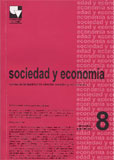El Partido de la Revolución Democrática (PRD) y su dirigencia fraccionada
Published:
2005-01-15
Keywords:
Partidos políticos, dirigencia partidista, PRD, institucionalización, fracciones, carisma, reglas informales.Main Article Content
This paper deals with the case of the Mexican PRD (Partido de la Revolución
Democrática). It studies the organizational evolution of PRD using a model of
institutionalizaton which diverges from classical theories and conceives their
institutionalization in a less strict way, as they lack formally strong structuration.
The text shows the capacity of informal party agreements to allow for relative
degrees of institutionalization of a leadership that is originally disjointed. In this way the theoretical perspective indicates that party institutionalization does not necessarily implies an organizational development manifested in rutinized practices.
Democrática). It studies the organizational evolution of PRD using a model of
institutionalizaton which diverges from classical theories and conceives their
institutionalization in a less strict way, as they lack formally strong structuration.
The text shows the capacity of informal party agreements to allow for relative
degrees of institutionalization of a leadership that is originally disjointed. In this way the theoretical perspective indicates that party institutionalization does not necessarily implies an organizational development manifested in rutinized practices.
1.
Martínez González VH. El Partido de la Revolución Democrática (PRD) y su dirigencia fraccionada. soc.eco [Internet]. 2005 Jan. 15 [cited 2026 Feb. 13];(8):9-28. Available from: https://sociedadyeconomia.univalle.edu.co/index.php/sociedad_y_economia/article/view/4143
Downloads
Download data is not yet available.

This work is licensed under a Creative Commons Attribution-NonCommercial 4.0 International License.
Revista sociedad y economía editada por la Facultad de Ciencias Sociales y Económicas de la Universidad del Valle se encuentra bajo una Licencia Internacional Creative Commons Atribución - No comercial 4.0
Basada en una obra en http://sociedadyeconomia.univalle.edu.co

